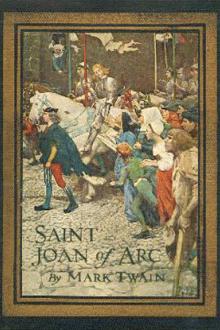Personal Recollections of Joan of Arc, vol 1, Mark Twain [read novel full TXT] 📗

- Author: Mark Twain
- Performer: -
Book online «Personal Recollections of Joan of Arc, vol 1, Mark Twain [read novel full TXT] 📗». Author Mark Twain
Now the several traditions were as I have said, some believing one and some another. One of them I knew to be the truth, and that was the last one. I do not say anything against the others; I think they were true, but I only know that the last one was; and it is my thought that if one keep to the things he knows, and not trouble about the things which he cannot be sure about, he will have the st3eadier mind for it—and there is profit in that. I know that when the Children of the Tree die in a far land, then—if they be at peace with God—they turn their longing eyes toward home, and there, far-shining, as through a rift in a cloud that curtains heaven, they see the soft picture of the Fairy Tree, clothed in a dream of golden light; and they see the bloomy mead sloping away to the river, and to their perishing nostrils is blown faint and sweet the fragrance of the flowers of home. And then the vision fades and passes—b they know, they know! and by their transfigured faces you know also, you who stand looking on; yes, you know the message that has come, and that it has come from heaven.
Joan and I believed alike about this matter. But Pierre Morel and Jacques d’Arc, and many others believed that the vision appeared twice—to a sinner. In fact, they and many others said they knew it. Probably because their fathers had known it and had told them; for one gets most things at second hand in this world.
Now one thing that does make it quite likely that there were really two apparitions of the Tree is this fact: From the most ancient times if one saw a villager of ours with his face ash-white and rigid with a ghastly fright, it was common for every one to whisper to his neighbor, “Ah, he is in sin, and has got his warning.” And the neighbor would shudder at the thought and whisper back, “Yes, poor soul, he has seen the Tree.”
Such evidences as these have their weight; they are not to be put aside with a wave of the hand. A thing that is backed by the cumulative evidence of centuries naturally gets nearer and nearer to being proof all the time; and if this continue and continue, it will some day become authority—and authority is a bedded rock, and will abide.
In my long life I have seen several cases where the tree appeared announcing a death which was still far away; but in none of these was the person in a state of sin. No; the apparition was in these cases only a special grace; in place of deferring the tidings of that soul’s redemption till the day of death, the apparition brought them long before, and with them peace—peace that might no more be disturbed—the eternal peace of God. I myself, old and broken, wait with serenity; for I have seen the vision of the Tree. I have seen it, and am content.
Always, from the remotest times, when the children joined hands and danced around the Fairy Tree they sang a song which was the Tree’s song, the song of L’Arbre fee de Bourlemont. They sang it to a quaint sweet air—a solacing sweet air which has gone murmuring through my dreaming spirit all my life when I was weary and troubled, resting me and carrying me through night and distance home again. No stranger can know or feel what that song has been, through the drifting centuries, to exiled Children of the Tree, homeless and heavy of heart in countries foreign to their speech and ways. You will think it a simple thing, that song, and poor, perchance; but if you will remember what it was to us, and what it brought before our eyes when it floated through our memories, then you will respect it. And you will understand how the water wells up in our eyes and makes all things dim, and our voices break and we cannot sing the last lines:
“And when, in Exile wand’ring, we Shall fainting yearn for glimpse of thee, Oh, rise upon our sight!”
And you will remember that Joan of Arc sang this song with us around the Tree when she was a little child, and always loved it. And that hallows it, yes, you will grant that:
L’ARBRE F�E DE BOURLEMONT
SONG OF THE CHILDREN
Now what has kept your leaves so green, Arbre F�e de Bourlemont?
The children’s tears! They brought each grief, And you did comfort them and cheer Their bruised hearts, and steal a tear That, healed, rose a leaf.
And what has built you up so strong, Arbre F�e de Bourlemont?
The children’s love! They’ve loved you long Ten hundred years, in sooth, They’ve nourished you with praise and song, And warmed your heart and kept it young— A thousand years of youth!
Bide always green in our young hearts, Arbre F�e de Bourlemont! And we shall always youthful be, Not heeding Time his flight; And when, in exile wand’ring, we Shall fainting yearn for glimpse of thee, Oh, rise upon our sight!
The fairies were still there when we were children, but we never saw them; because, a hundred years before that, the priest of Domremy had held a religious function under the tree and denounced them as being blood-kin to the Fiend and barred them from redemption; and then he warned them never to show themselves again, nor hang any more immortelles, on pain of perpetual banishment from that parish.
All the children pleaded for the fairies, and said they were their good friends and dear to them and never did them any harm, but the priest would not listen, and said it was sin and shame to have such friends. The children mourned and could not be comforted; and they made an agreement among themselves that they would always continue to hang flower-wreaths on the tree as a perpetual sign to the fairies that they were still loved and remembered, though lost to sight.
But late one night a great misfortune befell. Edmond Aubrey’s mother passed by the Tree, and the fairies were stealing a dance, not thinking anybody was by; and they were so busy, and so intoxicated with the wild happiness of it, and with the bumpers of dew sharpened up with honey which they had been drinking, that they noticed nothing; so Dame Aubrey stood there astonished and admiring, and saw the little fantastic atoms holding hands, as many as three hundred of them, tearing around in a great ring half as big as an ordinary bedroom, and leaning away back and spreading their mouths with laughter and song, which she could hear quite distinctly, and kicking their legs up as much as three inches from the ground in perfect abandon and hilarity—oh, the very maddest and witchingest dance the woman ever saw.
But in about a minute or two minutes the poor little ruined creatures discovered her. They burst out in one heartbreaking squeak of grief and terror and fled every which way, with their wee hazel-nut fists in their eyes and crying; and so disappeared.
The heartless woman—no, the foolish woman; she was not heartless, but only thoughtless—went straight home and told the neighbors all about it, whilst we, the small friends of the fairies, were asleep and not witting the calamity that was come upon us, and all unconscious that we ought to be up and trying to stop these fatal tongues. In the morning everybody knew, and the disaster was complete, for where everybody knows a thing the priest knows it, of course. We all flocked to P�re Fronte, crying and begging—and he had to cry, too, seeing our sorrow, for he had a most kind and gentle nature; and he did not want to banish the fairies, and said so; but said he had no choice, for it had been decreed that if they ever revealed themselves to man again, they must go. This all happened at the worst time possible, for Joan of Arc was ill of a fever and out of her head, and what could we do who had not her gifts of reasoning and persuasion? We flew in a swarm to her bed and cried out, “Joan, wake! Wake, there is no moment to lose! Come and plead for the fairies—come and save them; only you can do it!”
But her mind was wandering, she did not know what we said nor what we meant; so we went away knowing all was lost. Yes, all was lost, forever lost; the faithful friends of the children for five hundred years must go, and never come back any more.
It was a bitter day for us, that day that P�re Fronte held the function under the tree and banished the fairies. We could not wear mourning that any could have noticed, it would not have been allowed; so we had to be content with some poor small rag of black tied upon our garments where it made no show; but in our hearts we wore mourning, big and noble and occupying all the room, for our hearts were ours; they could not get at them to prevent that.
The great tree—l’Arbre F�e do Bourlemont was its beautiful name—was never afterward quite as much to us as it had been before, but it was always dear; is dear to me yet when I got there now, once a year in my old age, to sit under it and bring back the lost playmates of my youth and group them about me and look upon their faces through my tears and break my heart, oh, my God! No, the place was not quite the same afterward. In one or two ways it could not be; for, the fairies’ protection being gone, the spring lost much of its freshness and coldness, and more than two-thirds of its volume, and the banished serpents and stinging insects returned, and multiplied, and became a torment and have remained so to this day.
When that wise little child, Joan, got well, we realized how much her illness had cost us; for we found that we had been right in believing she could save the fairies. She burst into a great storm of anger, for so little a creature, and went straight to P�re Fronte, and stood up before him where he sat, and made reverence and said:
“The fairies were to go if they showed themselves to people again, is it not so?”
“Yes, that was it, dear.”
“If a man comes prying into a person’s room at midnight when that person is half-naked, will you be so unjust as to say that that person is showing himself to that man?”
“Well—no.” The good priest looked a little troubled and uneasy when he said it.
“Is a sin a sin, anyway, even if one did not intend to commit it?”
P�re Fronte threw up his hands and cried out:
“Oh, my poor little child, I see all my fault,” and he drew here to his side and put an arm around her and tried to make his peace with her, but her temper was up so high that she could not get it down right away, but buried her head against his breast and broke out crying and said:
“Then the fairies committed no sin, for there was no intention to commit one, they not knowing that any one was by; and because they were little creatures and could not speak for themselves





Comments (0)